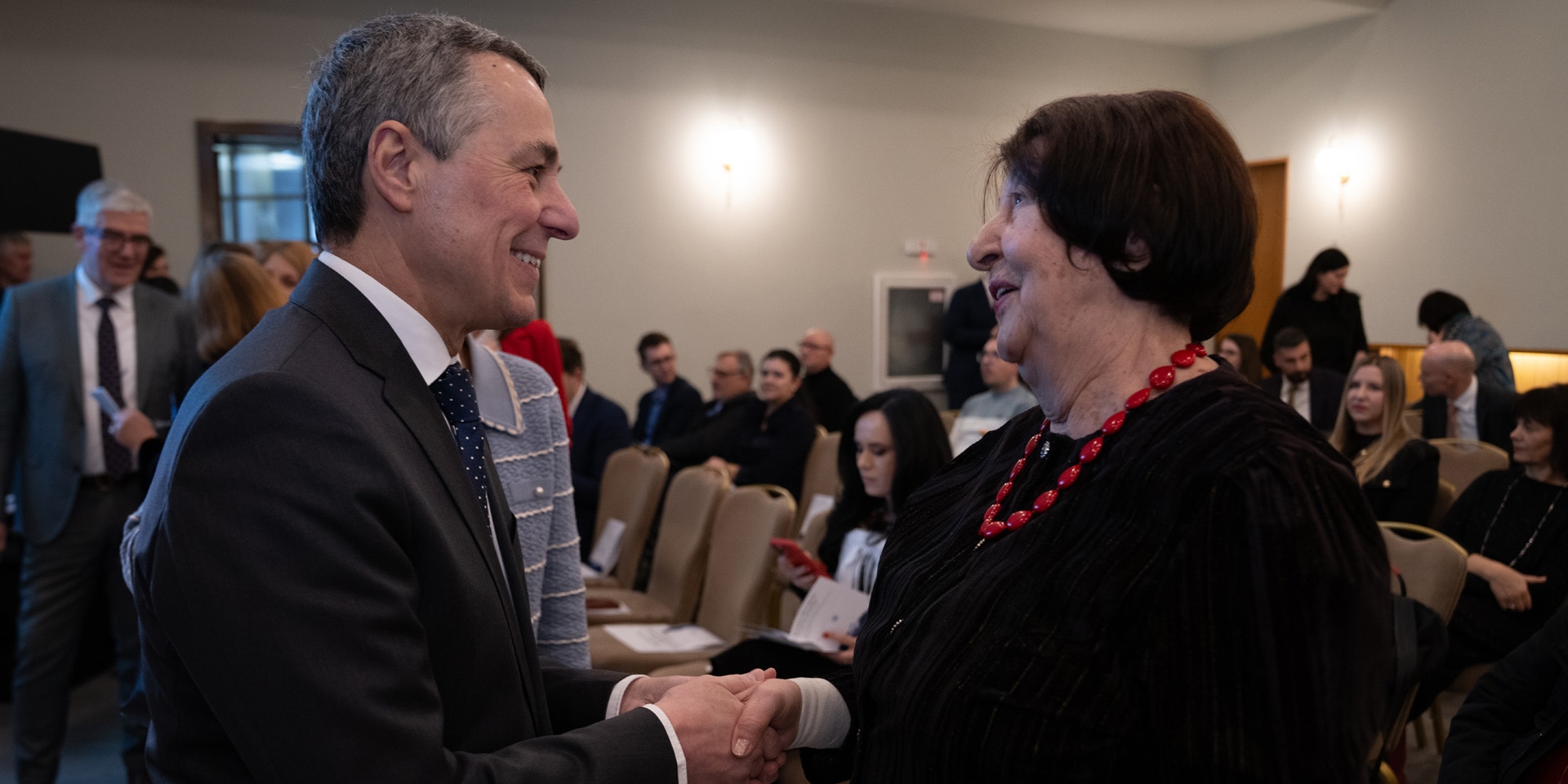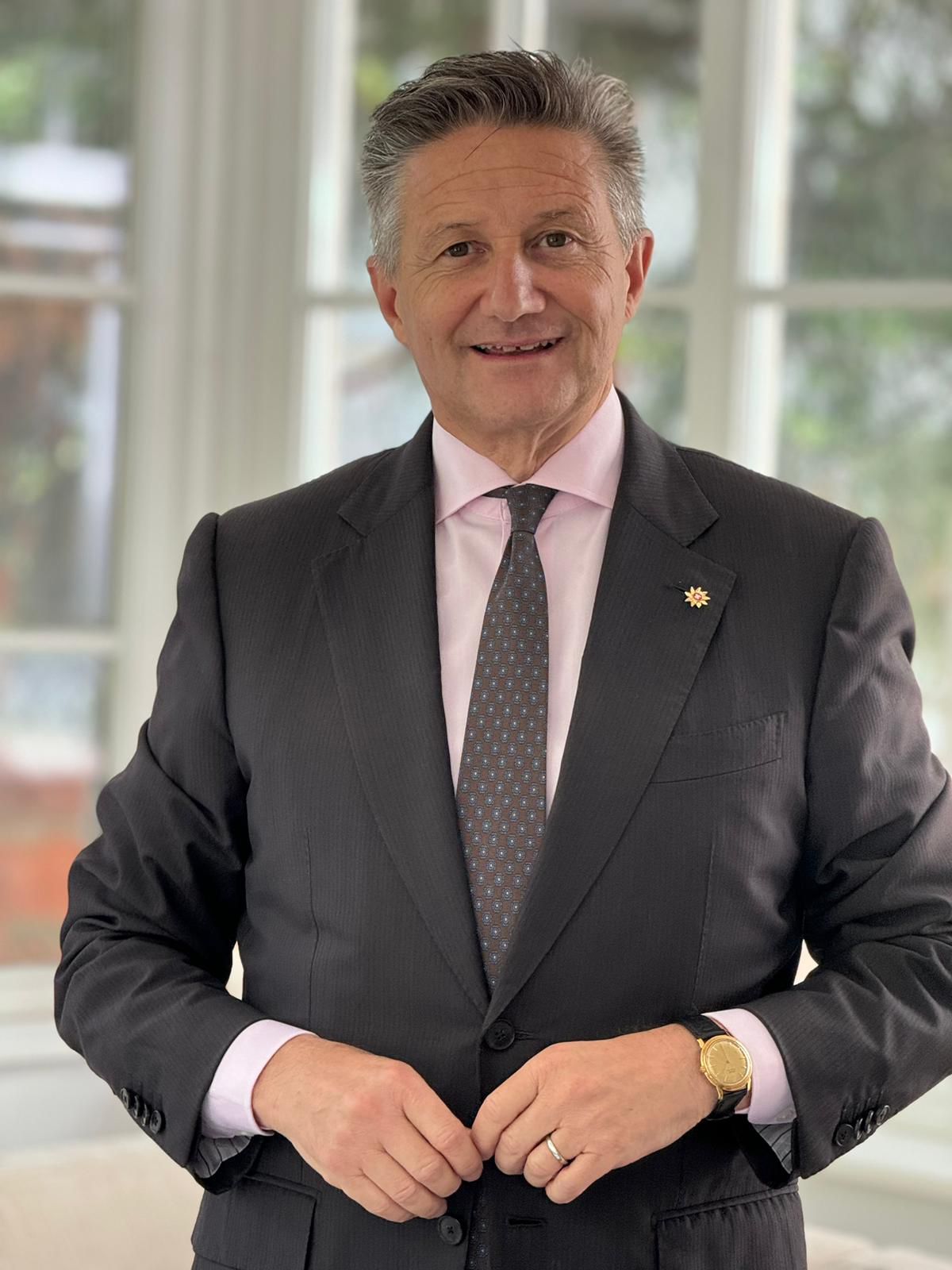Celebrating the 5th edition of Emna rumantscha in Romania
On 20 February 2025, Federal Councillor Ignazio Cassis will mark the fifth Romansh Language Week (Emna rumantscha) in Bucharest. The event, which is a joint initiative of the FDFA, the canton of Graubünden and Lia Rumantscha, aims to showcase Switzerland's plurality abroad. Mr Cassis, who heads the FDFA, will undertake this year's celebrations as part of his official visit to Romania, one of the themes of which is minorities. Various bilateral meetings and the signing of cooperation agreements are also on the agenda. We spoke to Switzerland's ambassador to Romania, Massimo Baggi.

Federal Councillor Ignazio Cassis took part at the cultural event organised to mark the 5th edition of the Emna rumantscha in Bucharest. © FDFA
This article is also available in Romansh.
This 20 February 2025, Romansh will be spoken in Bucharest. The Sursilvan dialect in particular. Why? Because of the 5th edition of Emna rumantscha, attended by Mr Cassis and representatives of the canton of Graubünden as well as the Romanian authorities. In collaboration with the Dimitrie Gusti National Village Museum, the FDFA has organised this year's event bringing together both Swiss and Romanian wordsmiths who embody the very raison d'être of this initiative launched by the head of the FDFA. And why Romania? Because Switzerland and Romania share something in common – a multicultural and multilingual way of life. "Emna rumantscha is an opportunity to share with other countries the daily experience of living among a wide diversity of cultures and opinions. Plurality is a resource that nurtures dialogue, something that is becoming ever-more essential in today's difficult geopolitical context," Mr Cassis notes.
Among the personalities at this year's Emna rumantscha is Magdalena Popescu-Marin, who has translated works from her mother tongue into Romansh. This surprising story of a 91-year-old Romanian linguist fluent in Sursilvan builds a unique bridge between the two cultures, which are actually more similar than they may seem.
Switzerland's ambassador to Romania, Massimo Baggi, talks about the model of interculturalism promoted in Romania as well as other highlights of Mr Cassis' upcoming visit.

Both Switzerland and Romania are committed to ensuring that people with different languages and cultures are able to live side by side, complementing and enriching each other within the same territory. In Romania, how is this actually put into practice?
Like Switzerland, Romania is a country made up of numerous minorities, each one having retained its own specific identity and importance. At present, 20 different ethnic groups are recognised and represented in Romania including Hungarians, Roma, Germans, Italians, Ukrainians and Russians. While each often carries tangible weight at regional level, it can sometimes even acquire a national dimension – like the largest group, the Hungarians, who have created their own national political party. This party is now part of the current coalition government in Bucharest, with over 6% of the vote. The Romanian parliament is keenly aware of the importance of the country's national minorities, and provides explicit support and protection for their respective identities by reserving one seat for each recognised minority group. The National Minorities Council now has 20 members, who sit in the same capacity as the other MPs. You'll often hear Switzerland's national languages being spoken in Romania. In fact, my integration here as a native Italian speaker was much easier given the many similarities with the Romanian language.
The official Emna rumantscha event is taking place on 20 February, an important date for both Romania and Switzerland...
Yes, on this day in 1856 the slavery of Roma in the Romanian principalities was abolished – an important part of Romania's social modernisation. And on the same day in 1938, Romansh was officially declared Switzerland's fourth national language. Don't forget that 21 February is also International Mother Language Day, so we have a triple anniversary to promote this simple yet highly relevant message: cultural and linguistic diversity are key to building a sustainable society. Ultimately, ours is a message of peace. It's clear that multilingualism fosters the tolerance and respect for diversity that's needed to ensure we can live together side by side in one society. Romanians understand this only too well – all of the great empires, particularly the Roman Empire, have passed through here, leaving traces that can be seen in the ethnic, cultural and linguistic mosaic that is Romania today. So now we're here, in Romania together, to juggle and bring together the words that are the fruit of a history that has survived globalisation but still unite us, as in the past, to this day.
The head of the FDFA is also scheduled to visit the port city of Constanța. What's special about this place?
Constanța is Romania's fourth largest city and is located in the far east of the country on the western shores of the Black Sea. It's the principal port on the Black Sea coast, giving both Romania and Europe as a whole a crucial geostrategic position. It's also home to a number of ethnic and linguistic minorities, including Turks (3.3%), Tatars (3.1%) and Roma (2.7%).
During Mr Cassis' upcoming visit, a debate on the importance of minority languages for regional development will be organised with local stakeholders. Romania has a major political role to play with the war in Ukraine, making it a credible and increasingly influential player on the international stage. NATO has considerably strengthened its presence in the east of Romania, and the strategic importance of the Danube Delta border has become increasingly significant. The visit to Constanța will provide an opportunity to gain a better understanding of the security issues involved in the Ukraine conflict and to continue discussions on recovery efforts there.
Among the highlights of Mr Cassis' visit are a number of bilateral meetings. What are the key points on the agenda?
In addition to multilateral affairs and questions of security and regional cooperation, the meeting with Romania's prime minister and minister of foreign affairs will provide an opportunity to discuss our respective positions in Europe, particularly Switzerland's second contribution to Romania, which has been allocated under the second Swiss contribution to selected EU states. This will be fleshed out during our meeting with the finance minister, who is responsible for coordinating our 11 cooperation programmes.
So what are the cooperation agreements between Switzerland and Romania that Mr Cassis is expected to sign?
Mr Cassis' visit provides an excellent opportunity to sign the implementation agreements for some of these programmes. The CHF 221.5 million contribution to Romania makes it the second largest beneficiary of the second Swiss contribution to selected EU states. Our cooperation programmes cover a range of topics that are particularly relevant for both Switzerland and Romania, such as dual vocational education and training, SME financing, energy efficiency, social inclusion and research and innovation. With the effective implementation of these programmes, we are launching the final operational phase of our cooperation, to be completed before 2029.
Emna rumantscha in brief
The Romansh Language Week (Emna Rumantscha), which is celebrating its 5th edition in 2025, was launched by Mr Cassis in Zuoz in 2019 to mark the Lia Rumantscha's 100th anniversary. The event, organised by the FDFA together with the canton of Graubünden and the Lia Rumantscha, always takes place in the week of 20 February, the day in 1938 when Romansh officially became Switzerland's fourth national language.
The aim is to highlight the importance of multilingualism not only for national cohesion, but also for Swiss foreign policy. Plurality is in fact a characteristic of Switzerland that is appreciated all over the worldPromoting minority languages, and through them cultural minorities, is essential to building a sustainable society that is open to dialogue.
Links
- Press release: Cooperation agreements and minorities: Federal Councillor Ignazio Cassis on official visit to Romania, 18.02.2025
- Address by Federal Councillor Ignazio Cassis: "Svizzera-Romania, la musica delle lingue", Bucharest 20.02.2025
- Address by Federal Councillor Ignazio Cassis: “Ensemble dans la diversité”, Constanta, 21.02.2025
